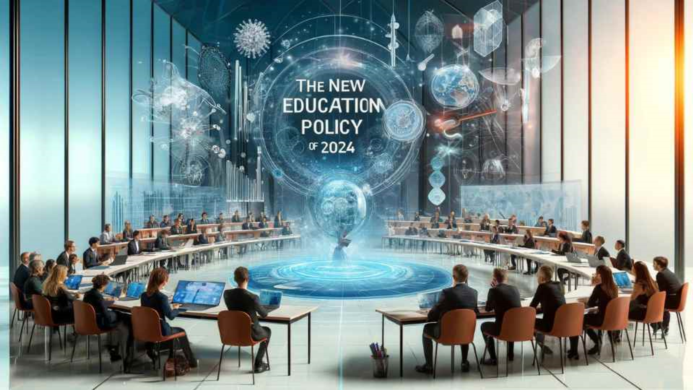
blog address: https://blogs.helloparent.com/2024/02/09/new-education-policy-2024-changes-you-need-to-know-about/
blog details:
An important milestone in India's drive to become a powerful information powerhouse on the international scene is the New education policy 2024 Educational. This strategy, which was designed to meet the demands of the modern world, modernizes the educational landscape by including digital empowerment, holistic learning, and a strong framework for skill development. This reform, which is being carried out by the Indian government under the auspices of the updated National Education Policy, is more than just a policy update; rather, it represents a rebirth of the educational philosophy that will meet the varied needs of students from preschool through higher education.
With this transformation, the erstwhile Ministry of Human Resource Management has been rechristened as the Ministry of Education, signaling a deeper, more focused commitment to educational excellence. A cornerstone ambition of the policy is to universalize education across all stages, aiming for a 100% Gross Enrollment Ratio in school education by 2030, with specific exclusions for medical and legal studies. This bold stride is underpinned by a framework meticulously designed to embrace learners from myriad backgrounds, fostering global citizens deeply rooted in local culture and values.
Educational Blueprint for 2024: A Closer Look
The reform is built on several pillars, each contributing to a reimagined educational landscape:
Holistic Learning Paradigm: Central to the policy is the cultivation of learners' cognitive, emotional, and societal faculties, ensuring a balanced development conducive to navigating the modern world's complexities.
Early Childhood Educational Emphasis: Recognizing the criticality of the formative years, the policy places unprecedented focus on Early Childhood Care and Education (ECCE), aiming to set a strong educational foundation for every child.
Innovative Curriculum Structure: The introduction of a novel 5+3+3+4 curriculum structure is a significant leap towards experiential and skill-oriented learning, promising a seamless educational continuum from early years to secondary schooling.
Vocational Training Integration: With an ambitious target to expose 50% of learners to vocational education by 2025, the policy envisions a workforce ready for the future's challenges.
Regional Language Utilization: Advocating for instruction in regional languages up to Grade 5, the policy acknowledges the importance of linguistic roots in learning processes.
Digital Education Thrust: The deployment of digital platforms such as DIKSHA signifies a leap towards making quality education accessible and equitable, transcending geographical and socio-economic barriers.
Revolutionized Assessment Mechanisms: Transitioning from traditional rote-learning evaluations to comprehensive, adaptive assessments, the policy aims to foster a deeper, application-oriented learning culture.
Educator Development Initiatives: Recognizing the pivotal role of teachers, the policy introduces continuous professional development to equip educators with modern pedagogical skills.
Inclusive Education Commitment: Ensuring no learner is left behind, the policy is resolute in making education accessible to all, breaking down barriers of socio-economic status or physical challenges.
Goals and Aspirations
The policy's overarching ambition is to elevate India's educational standards to global acclaim, facilitating the country's ascendancy as a leader in knowledge-intensive sectors. This mission is propelled by strategic amendments aimed at enhancing educational quality and accessibility.
Comprehensive Features and Forward-Looking Measures
This educational overhaul is rich in features aimed at modernizing India's educational infrastructure—ranging from a revised curriculum pattern that abolishes traditional streams to the introduction of coding from a young age, and the digitalization of all schools. The policy also ventures into higher education reforms, advocating for multidisciplinary institutions and flexible course structures, alongside the innovative academic credit bank system.
Implementation and Evolution
The Ministry is committed to setting up a dedicated committee for the policy's implementation and periodic review, ensuring the reform's objectives align with ground realities. Additionally, a task force will oversee the transformation of the credit system and the evolution of technical institutes into multidisciplinary entities, holding state and district officials accountable for any implementation delays.
Also Read: New Education Policy 2023
keywords: new education policy of 2024, new education policy, new education policy of india
member since: Apr 20, 2024 | Viewed: 58



